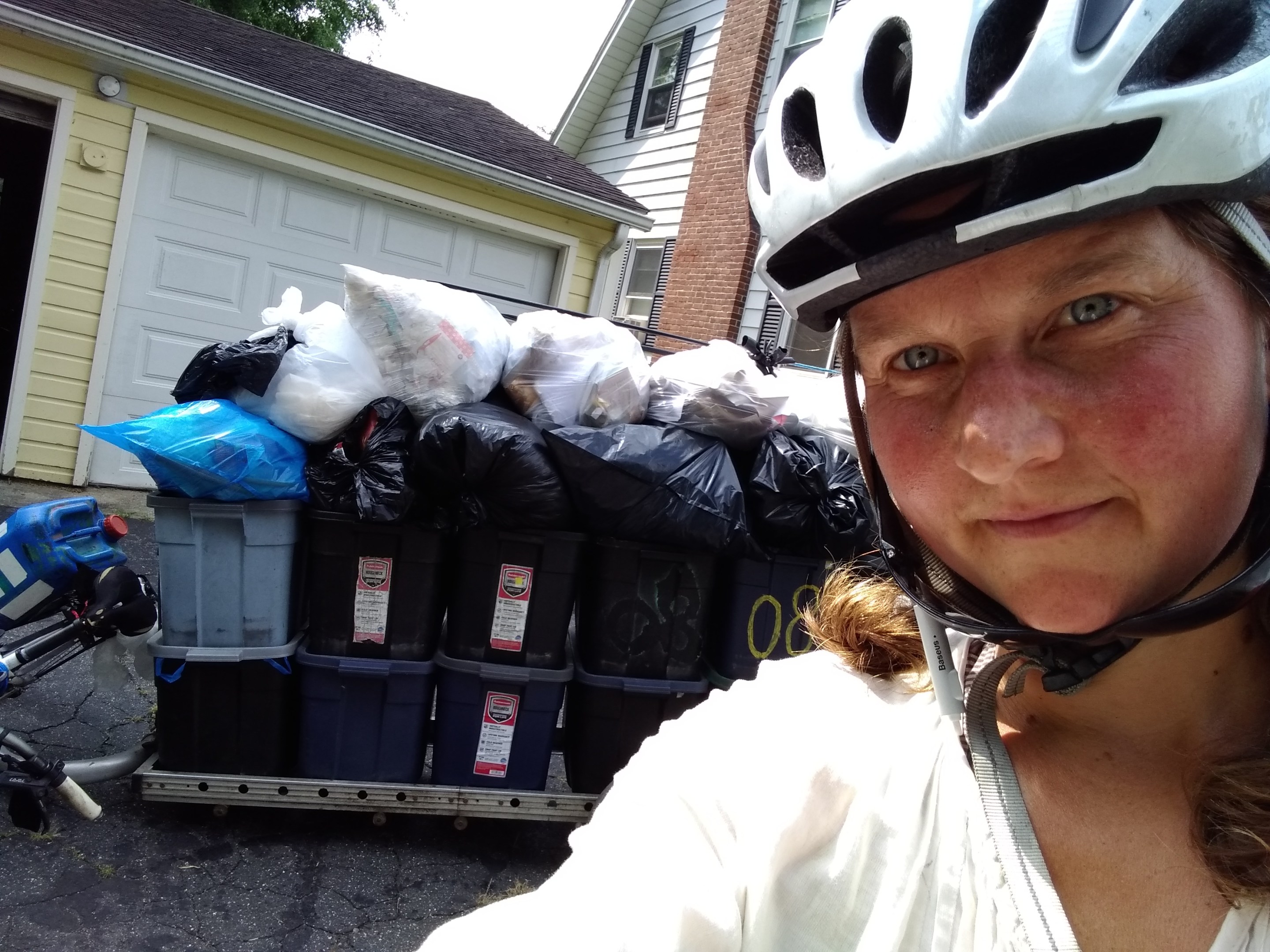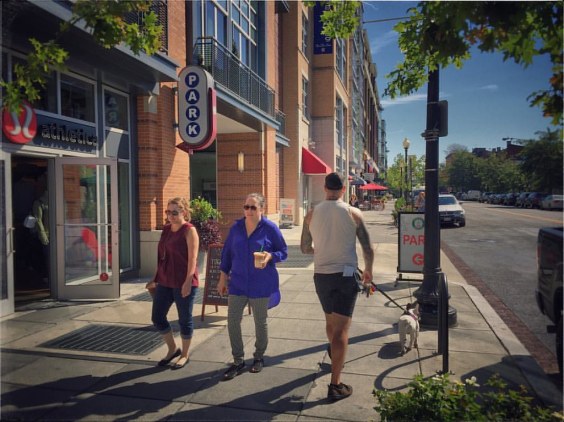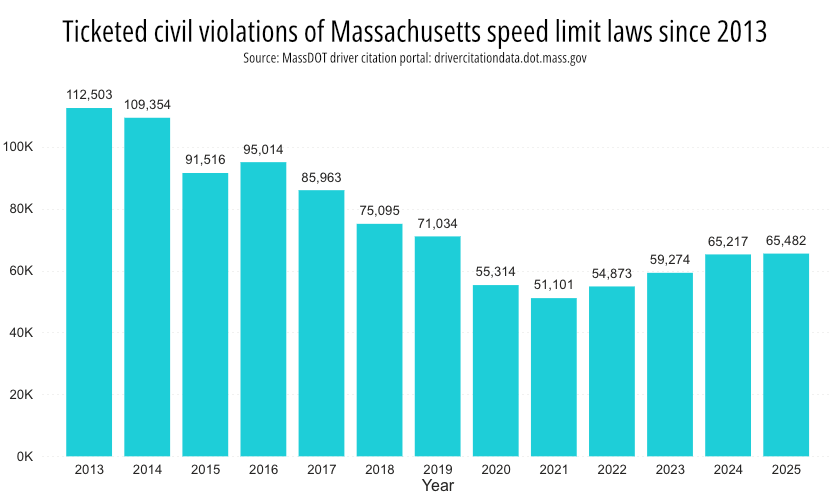Since 2007, the City of Northampton has relied on Pedal People, a cooperatively-owned, bike-powered transportation company, to provide garbage and recycling hauling services for the city’s public trash cans.
Pedal People, a cooperative started by Alex Jarrett and Ruthy Woodring in 2002, uses bicycles and bike trailers to transport goods and provide services, “model[ing] the use of human power as a viable alternative to fossil fuels,” according to their mission statement.
Pedal People services approximately eighty public trash cans, and also provides trash pick-up services for ten to twelve percent of Northampton’s roughly 11,200 households.
How has Pedal People succeeded for nearly two decades in running a cooperative business devoted to the use of bicycles instead of fossil-fuel reliant larger vehicles that could haul their loads quickly and easily? Is it possible to duplicate Pedal People’s success outside of a small city that was once called the “most liberal medium-sized city” in the country?
Annie Doran has been a Pedal Person for six years and is one of 25 current owner-workers. The collective functions as a flat hierarchy--there are no bosses, everyone pedals, and everyone does some sort of administrative work. Annie also has her own consulting business in which she “helps organizations find and live their values and keep employees engaged,” and is currently working with a start-up in Norway, Maine (population 5,014 according to the 2010 Census) that seeks to emulate Pedal People’s model.
“We’ll see in about a year!” answers Doran when I ask her if it’s possible to duplicate Pedal People’s success. She emphasizes their deliberately slow growth and small service area as reasons behind their staying power.
“One way we’ve been able to live out our values is keeping a low overhead, which allows us to only use as much as we need. Our advertising and marketing is primarily through word of mouth. Our business has increased by just ten percent per year since our beginnings; thanks to this slow growth, we haven’t had to be nimble,” says Doran.
She also points out that the city of Northampton has no municipal trash and recycling collection program. Residents must hire someone to haul their trash or haul their trash themselves, so Pedal People provides a necessary community service.
They currently have a waiting list for new customers and are beginning to expand their services into neighboring Easthampton, but like everything else they do, slow and steady is the key.
On the subject of slow and steady, I asked Annie if there was anything that has been impossible for Pedal People to move due to their sole reliance on human power.
“People have been surprised at how much we can move when we have enough time,” she says. “We’ve moved the entire contents of apartments! We have started considering using electric-assist bikes, but that’s on hold during the pandemic. It gets away from our historical values (of relying entirely on human power) but it gets at our other strong values of self care, reaching more customers, and engaging a more diverse group of possible hires.”
The possibility of using electric-assist bikes in Massachusetts is complicated by the fact that the state doesn’t differentiate between e-bikes and higher-speed mopeds and scooters.
MassBike, a statewide bicycle advocacy organization, has been lobbying for updated state laws to differentiate between lower- and higher-speed bicycles in order to make e-bikes subject to the same laws as regular bicycles. This would certainly benefit Pedal People and other bicycle-based businesses currently using or considering using e-bikes.
Massachusetts is one of just six states whose current e-bike laws are considered “problematic” by advocacy group People For Bikes due to the difference in e-bike access to regular bikes’ infrastructures as well as confusing equipment, use, licensing, and registration requirements. The current bills filed in the Massachusetts House and Senate use People For Bike’s model legislation that defines and regulates three classes of e-bikes.
Companies like Pedal People could also benefit from the new federal transportation bill, the INVEST In America Act, which could reinstate and improve a bicycle commuter benefit that was suspended in a 2017 tax cut law.
The new bill would require areas with high rates of bicycle fatalities to improve safety and require all states to have a full time Bicycle and Pedestrian Coordinator. It would also establish a National Road Safety Assessment, as originally proposed by Massachusetts State Representative Stephen Lynch, that requires identifying and cataloging roads and intersections that are unsafe for bikers and pedestrians.
Several Massachusetts legislators are involved in this legislation including Representative Ayanna Pressley, as Co-Chair of the Congressional Bike Caucus, and Representative Richard Neal, who, as the Chair of the Ways and Means Subcommittee, reinstated the Bicycle Commuter Act into the larger INVEST package.
Better transportation policy may lead to more bike-based businesses, but can Pedal People’s “slow and steady” growth, using only what is absolutely necessary, be applied to businesses in general?
The climate crisis forces us to do an all-encompassing reconsideration of our reliance on fossil fuels, and the COVID-19 pandemic has forced the business world to re-think its relationships with employees and customers.
“People power” offers an intriguing solution, emphasizing thoughtfulness and humanity over industrial concepts of speed and efficiency.
Galen Mook, Executive Director of MassBike, draws parallels between Pedal People’s approach and Vision Zero, the policy goal that aims to eliminate all traffic fatalities and severe injuries by treating those tragedies as preventable, rather than inevitable, and using a systems approach to create safer streets, rather than relying on individual responsibility alone.
“We need to move to a mindset that safety is more important than throughput, or just getting cars through intersections,” says Mook. “We need to keep the focus on the people, especially those most vulnerable out there."
Karen Corday is a freelance writer based in Northampton, Mass.






